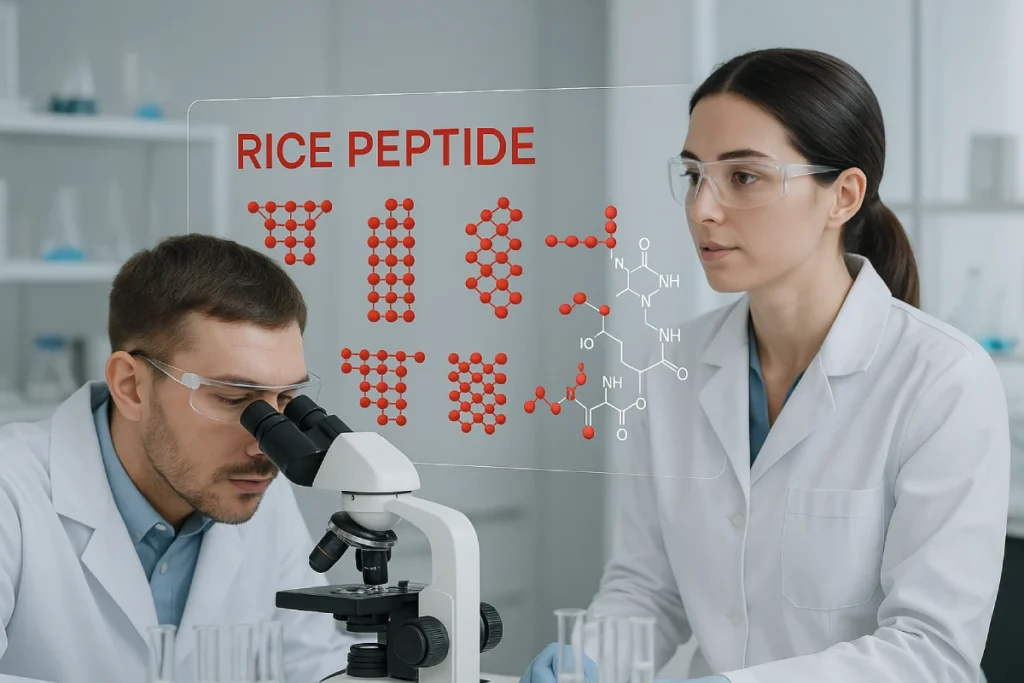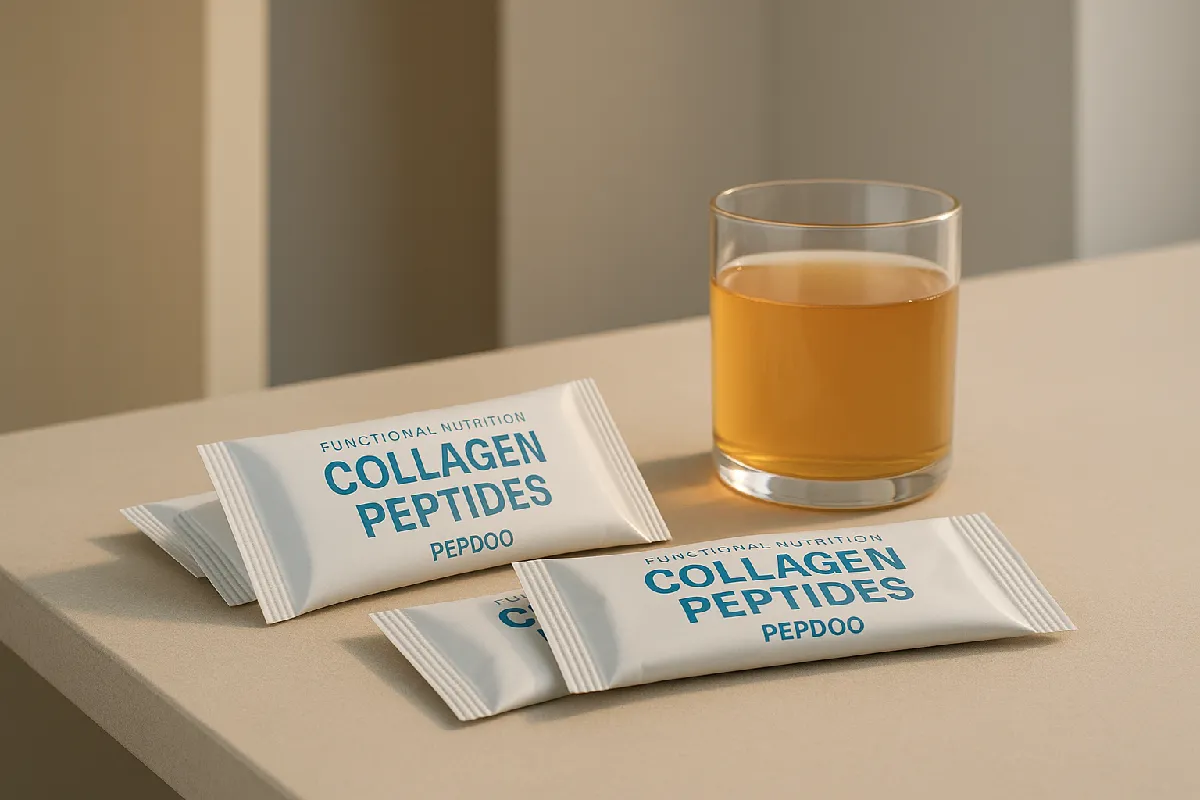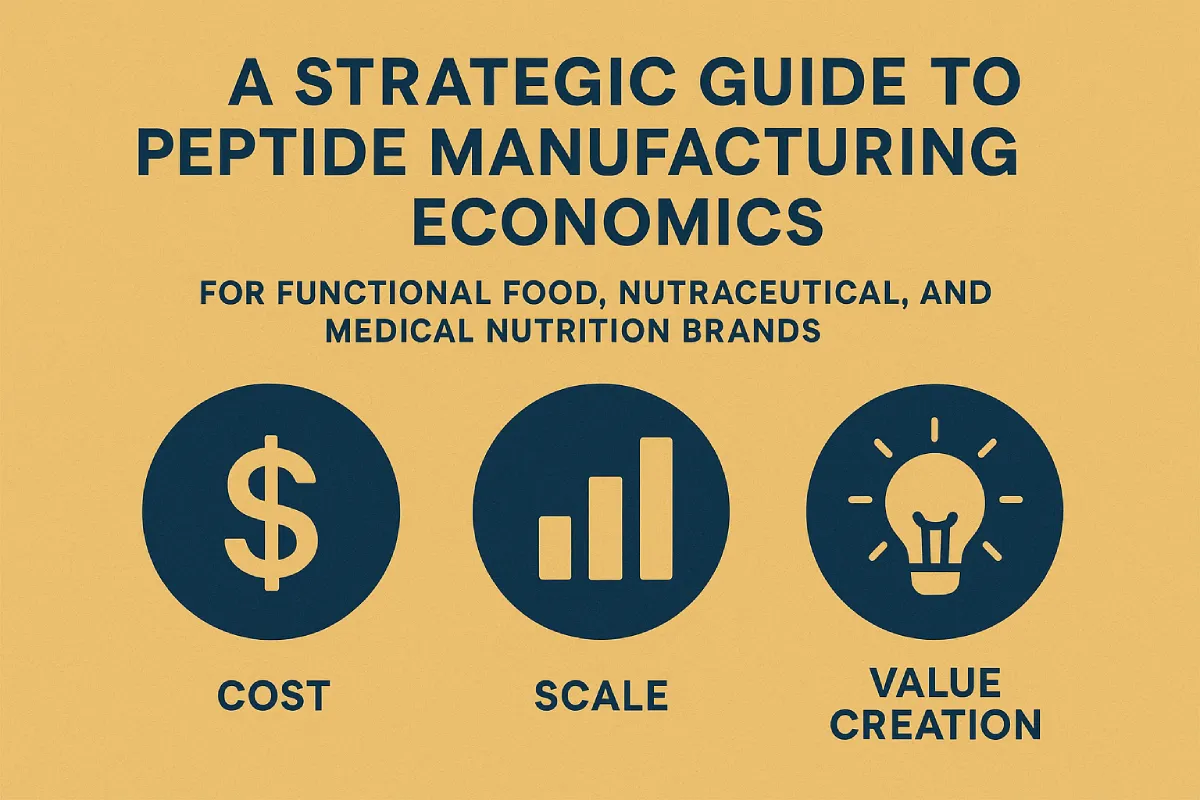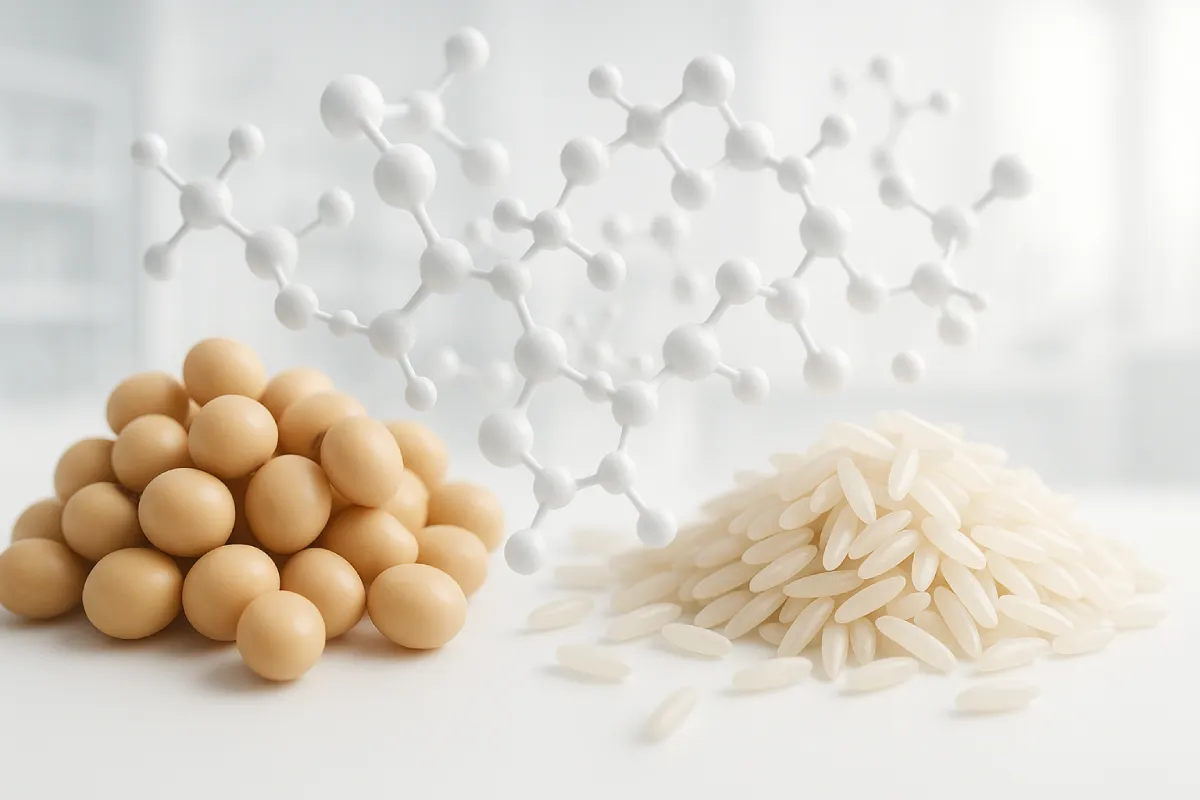The Power of Gentle Protein Innovation
Rice peptide — a small-molecule fraction derived from enzymatically hydrolyzed rice protein — is rapidly emerging as a strategic ingredient for infant nutrition and senior nutrition because it reconciles two priorities that matter to B2B brands: gentle tolerance and functional efficacy. For infants at risk of cow’s-milk protein allergy (CMPA) and for older adults with impaired digestion and sarcopenia risk, rice peptide delivers high digestibility, low allergenicity and a tunable amino-acid/peptide profile that supports growth, immunity and muscle maintenance.
As a full-range peptide manufacturer and industry partner, PEPDOO® leverages patented enzymatic hydrolysis and controlled fermentation to produce rice peptide batches with predictable molecular-weight distributions, flavor neutrality and clinical-grade safety. This article is written for procurement, R&D and b

Understanding the Demand: Nutrition Challenges at Both Life Ends
Two populations drive complementary needs that a single ingredient can address:
- Infants (0–24 months) — immature digestive systems, higher prevalence of feeding intolerance and a measurable subset with CMPA. Hypoallergenic, nutritionally complete formulas that still support normal growth are required.
- Older adults (60+) — declining appetite and protein intake, impaired digestion, and elevated sarcopenia risk demand high-bioavailability proteins that are easy to digest and can be incorporated into oral nutrition supplements or enteral feeds.
Market signals show growing commercial interest in plant-derived, clean-label peptide ingredients that reduce allergen risk while enabling functional claims for immunity, growth and muscle support. For B2B brand teams this creates a strategic opening: offer “gentle” products without sacrificing measurable physiological benefits. (Keyword signals: infant nutrition, senior nutrition, hypoallergenic peptide, functional nutrition ingredient.)
Rice Peptide: The Science Behind Its Gentle Strength
What rice peptide is (and why it’s mild). Rice protein is naturally low in common milk allergens; when enzymatically hydrolyzed to small peptides (commonly targeted <1,000 Da), the product becomes easier to absorb and far less likely to trigger IgE-mediated responses. Manufacturers can control degree of hydrolysis, peptide length and flavor profile to meet infant formula or clinical-nutrition specifications (keywords: rice peptide, rice protein hydrolysate).
Key biochemical advantages
- Improved digestibility and rapid uptake via peptide transporters in enterocytes.
- Enrichment in useful amino acids (e.g., branched-chain amino acids, glutamine) after targeted hydrolysis — useful for both anabolic signaling and gut mucosal integrity.
- Lower intrinsic allergenicity than milk proteins and soy, making rice peptide a logical choice when a hypoallergenic ingredient is required. [1].
Quality control matters. The functional behavior of rice peptide is determined by source, enzyme selection and downstream purification. PEPDOO®’s multi-enzyme hydrolysis and fermentation platform yields consistent low-molecular-weight distributions and neutral sensory profiles suitable for infant formulas and oral nutrition powders (keywords: peptide manufacturer, peptide supplier).
Functional Potentials: From Nutrition to Therapeutic Support
Rice peptide isn’t just a filler — it can deliver measurable functional benefits that B2B buyers and formulators can translate into product differentiation.
Core functional axes
- Tolerance & growth support in CMPA management. Clinical evidence supports hydrolyzed rice-protein formulas (HRFs) as a safe, growth-supporting alternative for many infants with cow’s- milk protein allergy. Randomized trials and systematic reviews indicate HRFs restore normal growth and are well-tolerated in >90% of infants with CMPA in several cohorts. [2].
- Digestive tolerance and enteral feeding advantages. Peptide-based enteral formulas (small peptides rather than intact proteins) improve gastrointestinal tolerance and nutrient delivery in patients with malabsorption — a concept widely implemented in clinical nutrition (e.g., peptide formulas used in hospital/home enteral care). [4].
- Muscle preservation & anti-sarcopenia potential. Recent work demonstrates that enzymatically treated rice protein hydrolysates show antioxidant activity and protective effects against muscle atrophy in preclinical models — evidence that rice peptide can be formulated into senior nutrition products aimed at sarcopenia mitigation. [3].
Evidence-based success snapshots (actionable for B2B buyers)
- Clinical tolerance: multicenter randomized trials show HRF supports normal growth and high tolerance rates in CMPA infants, making HRF a defensible FSMP choice for medically guided infant feeding. [2].
- Enteral performance: decades of clinical experience with peptide-based enteral feeds demonstrate faster recovery of feeding tolerance in vulnerable patients, validating the general principle that small-peptide ingredients improve GI uptake. [4].
- Functional innovation: enzymatic + nonthermal processing (e.g., HPP) of rice protein produces peptide fractions with antioxidant and myotube-protective activities — a direct R&D route to senior-targeted nutraceuticals. [3].
PEPDOO® Advantage: From Source Manufacturing to Global Standards
For product teams evaluating suppliers, consistency, traceability and regulatory readiness are non-negotiable. Here’s where PEPDOO® positions itself as a strategic partner:
- Full-range peptide manufacturer & trusted supplier. PEPDOO® produces a broad portfolio of animal- and plant-sourced peptides, including rice peptide grades tailored for infant formula, FSMP and senior nutrition formulations (keyword: peptide manufacturer / peptide supplier).
- Industry leadership & standards influence. As a recognized participant in China’s peptide standards development and among the front runners in small-molecule peptide patents in China, PEPDOO® translates regulatory alignment into faster product approvals and consistent spec packages for global clients.
- Patented process control. Proprietary enzyme blends + controlled fermentation produce low-bitterness, low-molecular-weight rice peptides with reproducible solubility and sensory profiles — reducing reformulation cycles and time-to-market for OEM/ODM partners.
- B2B service layer. From technical Dossiers and safety data (eg. endotoxin, heavy metals, allergen panels) to co-development in pilot trials, PEPDOO® supports customers through formulation bridging and regulatory documentation.
(Practical note for procurement: ask for batch COA, peptide distribution curve, and protocol for heavy-metal/arsenic testing when sourcing rice-derived ingredients for infant applications.)

Application Insights: Formulating for Infants and Seniors
Infant nutrition — practical formulation cues
- Use rice peptide as a partial or specialized protein source within FSMP / hypoallergenic ranges; fortify with limiting amino acids (e.g., lysine, threonine) as required by local infant-formula regulations. [1][2].
- Target peptide molecular weight, solubility and osmolality in line with feeding tolerance—PEPDOO® provides pre-validated grades to speed bench trials.
Senior & clinical nutrition — practical formulation cues
- Blend rice peptide with MCTs, vitamin D and leucine-rich fractions for anabolic signaling and energy density in oral nutrition supplements.
- Consider peptide-only enteral formulations for patients with compromised digestion; evidence shows peptide formulas aid GI tolerance and nutrient absorption in clinical settings. [4].
Flavor & sensory management
Hydrolysis can generate off-notes; PEPDOO®’s flavor-management (controlled DH, membrane separation) minimizes bitter fractions — critical for infant palatability and senior compliance.
Co-formulation examples (go-to product concepts)
- Hypoallergenic infant follow-on / FSMP line using rice peptide (partial protein replacement) with added nucleotides and prebiotics.
- Senior recovery shake: rice peptide + leucine/MCT blend + vitamin D for muscle support and easy digestion.
- Pediatric enteral supplement: rice peptide low-osmolality formula for GI-sensitive children.
Sustainability and Market Outlook: The Rise of Plant-Based Clinical Peptides
The business case for rice peptide is not only scientific — it’s commercial:
- Market momentum. The global bioactive protein & peptide market is expanding at a high single-digit to low double-digit CAGR, with plant-sourced peptide segments growing faster as brands chase clean-label and sustainability positioning. [5].
- Sustainability and supply security. Rice is globally abundant; rice protein can be sourced from milling streams and byproducts, improving circularity. For brands, plant peptide sourcing often yields a lower carbon footprint versus many animal-derived alternatives.
- Differentiation opportunity. For infant and senior product lines, plant-based, hypoallergenic, clinically supported peptide ingredients unlock premium positioning and regulatory pathways for FSMP / medical nutrition channels.
Rice Peptide Solutions for Next-Generation Functional Nutrition Brands
Rice peptide is a pragmatic, evidence-backed ingredient that bridges safety and function — especially for infant products requiring hypoallergenic solutions and for senior nutrition products that demand high bioavailability and muscle-preservation potential. Clinical trials and mechanistic studies support HRF and rice peptide utility; peptide-based enteral feeds validate the clinical value of small peptides in vulnerable populations. [1][2][3][4][5].
PEPDOO® is ready to partner with B2B brands as a supply and development partner — as a full-range peptide manufacturer, China’s peptide standards contributor and an owner of multiple small-molecule peptide patents, PEPDOO® delivers rice peptide raw materials, technical dossiers and co-development for infant formula, FSMP and senior nutrition innovations.
Partner with PEPDOO® for Next-Generation Peptide Nutrition
From infant formula to senior nutrition, PEPDOO® provides science-driven rice peptide solutions that combine safety, efficacy and innovation. As a full-range peptide manufacturer, China’s peptide standards contributor, and holder of multiple small-molecule peptide patents, we help global brands co-develop differentiated peptide ingredients for functional, clinical and specialized nutrition applications.
Start Your CollaborationFAQ
Rice peptide combines high digestibility, low allergenicity, and balanced amino-acid composition, making it ideal for populations with sensitive digestion. For infants, it offers a hypoallergenic alternative to milk proteins; for seniors, it supports better protein absorption and muscle preservation. PEPDOO® provides controlled molecular-weight rice peptides optimized for each application scenario.
PEPDOO® applies a multi-enzyme hydrolysis and controlled fermentation system under patented process conditions. Each batch undergoes full-spectrum analysis — including molecular-weight distribution, microbiological, endotoxin, heavy-metal, and allergen testing — ensuring FSMP-grade quality that meets China and global peptide standards.
Yes. Rice peptide is increasingly applied in Food for Special Medical Purposes (FSMP), especially in formulas targeting cow’s-milk protein allergy (CMPA), malabsorption, and post-surgery recovery. PEPDOO® supports FSMP developers with compositional data, digestibility studies, and ready-to-register documentation packages.
PEPDOO® rice peptide typically ranges between 300–1,000 Da. This range allows rapid intestinal absorption via peptide transporters while maintaining a neutral sensory profile. Custom specifications can be provided depending on target application — infant, senior, or functional food formulations.
PEPDOO® provides OEM/ODM co-development, pilot-scale trials, and formulation optimization services. Brands can request sample packs, peptide fingerprint data, and co-branded innovation support for global registration. As a China peptide standards contributor and one of the country’s top small-molecule peptide patent holders, PEPDOO® bridges R&D and commercial manufacturing for long-term partnership growth.
Yes. All PEPDOO® peptide products — including rice peptide — come with COA, MSDS, ingredient specifications, allergen statement, and ISO/HACCP certification. Documentation for EU, US, and ASEAN market registration can be provided upon request.
References
- Dupont, C., Bocquet, A., Tomé, D., Bernard, M., Campeotto, F., Dumond, P., … Kalach, N. (2020). Hydrolized Rice Protein-Based Formulas, a Vegetal Alternative in Cow’s Milk Allergy. Nutrients, 12(9), 2654.
- Lemoine, A., et al. (2024). Growth, Safety and Tolerance in Infants Fed Rice Protein Hydrolysate Formula: The GRITO Randomised Controlled Trial. Nutrients.
- Chen, S.-H., et al. (2023). Potential Anti-Sarcopenia Effect and Physicochemical and Functional Properties of Rice Protein Hydrolysate Prepared through High-Pressure Processing. Agriculture, 13(1), 209.
- Nestlé Health Science. (2025). Peptamen® — Enteral nutrition solutions. Nestlé Health Science.
- Fact.MR. (Sep 2024). Bioactive Protein and Peptide Market — Outlook 2024–2034. Fact.MR.






